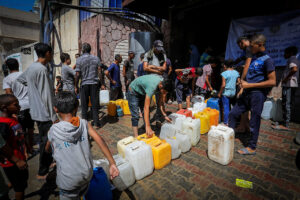The daily battles to survive the Gaza genocide

Palestinians collect drinking water in Deir al-Balah, central Gaza Strip, 3 August 2024
Yousef Aljamal reports in +972 on 14 August 2024:
Since October 7, my life has been split between two parallel realms. In the first, I go about my daily life as usual here in Turkey, where I work, visit my friends, do my routine shopping, and take care of my immediate family. In the second realm, I am immersed in the daily reports of the death, destruction, displacement, and fear that my family, friends, and neighbors are enduring in Gaza, and try to help them as much as possible.
My family in Gaza count themselves among the lucky ones: they have a roof over their heads. Thirty-five of my relatives are currently sharing my parents’ overcrowded house in Nuseirat refugee camp, in the center of the Gaza Strip. In January, they were temporarily displaced when Israel issued evacuation orders and sent tanks into the camp, but they subsequently managed to return.
With around 90 percent of Gaza’s 2.3 million residents displaced and living in makeshift tents, ill-equipped displacement centers, or on the streets, my family are better off than most. Yet they still face severe hardships and indignities every day, forced to drink polluted water and search for food and cooking supplies. This is what the daily struggle for survival looks like inside the besieged and bombarded Gaza Strip.
Queuing for days for two tins of beans
Since October, Israel’s “total siege” on Gaza has led to full-blown famine throughout the Strip. Humanitarian aid has been held up at entry points, and the little that has entered has been vastly inadequate. Israel’s destruction and takeover of the Rafah Crossing in May — through which most aid had been entering — has made the situation even more disastrous.
The U.S.-built pier off the coast of Gaza also proved ineffective, delivering only a fraction of what trucks can bring in before being dismantled after 25 days. Airdrops have done more harm than good, falling on Palestinian homes and tents and even killing several people.
In order to receive what limited aid is available, residents must stand in line for long periods; in some cases, friends have queued for days to get two tins of beans and some biscuits. What’s more, because Israel has routinely obstructed the entry of aid, residents have been getting ill from eating canned meats that expired while being held up for weeks at the Egyptian side of the Rafah Crossing. “Even the cats refused to eat that meat,” Abdullah Eid, my 27-year-old neighbor from Nuseirat, told me.
When aid shipments are distributed inside Gaza, residents receive small quantities of flour — some of which is also expired. But because most bakeries are no longer able to operate, Eid noted, “we have to buy wheat [that arrives in aid packages], grind it by hand, and bake it at home. Cooking gas is very limited and expensive, so we have to use wood from bombed-out houses and trees uprooted by airstrikes.” Some people have also resorted to building bread ovens out of clay, animal dung, and straw.
